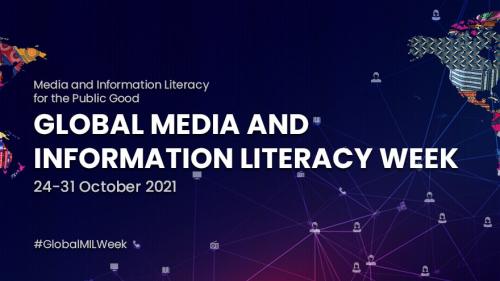
https://en.unesco.org/news/media-and-information-literacy-public-good-gl...
As the world battles the COVID-19 pandemic on several fronts, the misuse of social media and persistent rise in misinformation undermine efforts to fight the disease, threatening even more lives and costing even more livelihoods. We must consider new media and information literacy programmes to help people to understand the consequences of creating and sharing false and misleading conten
Cyril Ramaphosa, President of South Africa
The late great Nelson Mandela famously noted, “Education is the most powerful weapon which you can use to change the world”. Media and information literacy is fundamental to the promise of education for all.
The current information ecosystem keeps evolving in complex ways - opening up new opportunities but also challenges. It is hard to conceive of the public good being advanced, if the public is disempowered by false and misleading content, conspiracies theories and hate speech.
However, media and information literacy empowers people to develop themselves and their societies through enhanced capacities in communication and information.
Media and information literate people are equipped to better respond to potentially harmful kinds of content.
As the world recovers from the COVID-19 pandemic and continues to grapple with the alarming rise in disinformation, media and information literacy comes to the fore as a sustainable solution for building public resilience and for advancing the role of information as a public good.
Global Media and Information Literacy Week 2021 will highlight the importance of strengthening media and information literacy for all, looking towards a post-pandemic world. The priority is to empower citizens to engage with information while respecting the rights of others, to advance knowledge societies, and to combat expressions that are shown to harm human rights, peace and the public good.
The defining challenge of our time is to harness the power of fast-evolving digital technologies to effectively contribute to the promotion of information as a public good. In order to seize the opportunities and address content challenges, we need to recognize media and information literacy as an important factor for sustainable development. Media and information literacy, along with digital skills, are more than ever a sine qua non for an informed and resilient society. Therefore, national policies and strategies in these areas have become urgent for all countries.Tawfik Jelassi, Assistant Director-General for Communication and Information, UNESCO
Global Media and Information Literacy Week 2021 is being hosted for the first time in Sub-Saharan Africa since its inception in 2011. A focus will then be given to the role of media and information literate- citizens as change agents in furthering the Africa Agenda 2063. Stakeholders in the host country, South Africa, and more broadly in the African continent, will be mobilized to raise awareness to increase national take-up of media and information literacy.
The Feature Conference and Youth Forum of Global MIL Week 2021, as well as the third Global Media and Information Literacy Youth Hackathon will be led by UNESCO and the South African National Commission for UNESCO and will be held virtually.
Stakeholders worldwide are invited to celebrate the Week by organizing local events or activities and register them on the Global MIL Week website. More related information will be made available on the website.
Register as participant to your selected sessions here.
This year marks 10 years since the seeds of Global Media and Information Literacy Week were planted in 2011 in Fez, Morocco. Over the past decade, some major developments have taken place globally in the field of media and information literacy. On 25 March 2021, the UN General Assembly, in a resolution proclaiming the Global Week at UN level, further cemented media and information literacy as a mainstream and urgent public matter. Governments and digital communications companies are increasingly recognizing that media and information literacy competencies complements technical digital skills. Global Media and Information Literacy Week 2021 will build on this momentum.
The annual Global Media and Information Literacy Week is a major occasion for stakeholders to review and celebrate the progress achieved towards “Media and Information Literacy for All”. It is designed to enhance cooperation among stakeholders to sustain media and information literacy development.
UNESCO is thankful for the ongoing partnership of members of the UNESCO Media and Information Literacy Alliance and the UNESCO Media and Information Literacy and Intercultural Dialogue University Network.










Add new comment